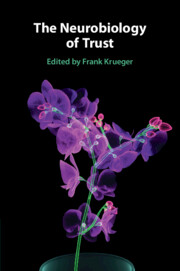Book contents
- The Neurobiology of Trust
- The Neurobiology of Trust
- Copyright page
- Dedication
- Contents
- Figures
- Tables
- Contributors
- Abbreviations
- Introduction
- Part I Fundamental Level of Trust
- Part II Neuropsychological Level of Trust
- Part III Neurocharacteristic Level of Trust
- Part IV Neuromolecular Level of Trust
- Part V Neuropathological Level of Trust
- Chapter 16 Trust and Psychotic Disorders
- Chapter 17 Trust and Personality Disorders
- Chapter 18 Trust and Lesion Evidence
- Index
- References
Chapter 16 - Trust and Psychotic Disorders
Unraveling the Dynamics of Paranoia and Disturbed Social Interaction
from Part V - Neuropathological Level of Trust
Published online by Cambridge University Press: 09 December 2021
- The Neurobiology of Trust
- The Neurobiology of Trust
- Copyright page
- Dedication
- Contents
- Figures
- Tables
- Contributors
- Abbreviations
- Introduction
- Part I Fundamental Level of Trust
- Part II Neuropsychological Level of Trust
- Part III Neurocharacteristic Level of Trust
- Part IV Neuromolecular Level of Trust
- Part V Neuropathological Level of Trust
- Chapter 16 Trust and Psychotic Disorders
- Chapter 17 Trust and Personality Disorders
- Chapter 18 Trust and Lesion Evidence
- Index
- References
Summary
Psychotic disorders are characterized by problems in interpersonal, social functioning. Paranoid ideation reflects severe suspiciousness and distrust in others. However, the neural mechanisms underlying these social symptoms are largely unknown. Here, we discuss studies investigating trust in psychosis by means of the interactive trust game, and through trustworthiness ratings of faces. Across all the stages of the continuum reduced baseline trust was found in various studies, possibly suggesting a trait-like vulnerability for psychosis. In repeated interactions chronic patients engage less in trust honouring interactions, although they show intact reactions to facial expressions. Overall, first-episode patients and individuals at high risk for psychosis also show reduced trust, but are able to learn to trust over repeated interactions. Several factors that can influence trust are discussed. At the neural level, differential activation in brain regions associated with theory of mind and reward processing were found in individuals with psychosis across illness stages. Theoretical accounts considering motivation, cognition and affect are discussed and suggestions for future research are formulated.
Keywords
- Type
- Chapter
- Information
- The Neurobiology of Trust , pp. 389 - 429Publisher: Cambridge University PressPrint publication year: 2021
References
- 1
- Cited by

